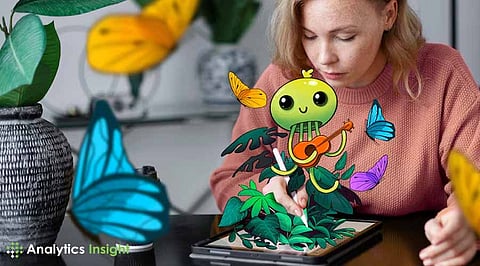

Owing to the rapid development of artificial intelligence (AI) has enhanced the generation of content the issue of creation replacement has emerged. As we see, with an increase in effectiveness and scalability of AI-driven approaches, the issues of authorship, authenticity and the place of human-inspired creativity in such areas arise.
A lot of sectors have used AI technologies in the production of content. AI tools can write articles, create graphics, and even create music in a much shorter amount of time and for less money than creators. For instance, one can use ElevenLabs to design real-sounding voices for podcasts and other narrations that are an illustration that AI is now a media maker.
Many content writers are worried about threats by artificial intelligence to their employment. Specifically, this area of work is evolving due to institutions like journalism and marketing; and fields like art making where AI systems have started to take over tasks that once humans did. An example of this can be Sora, a tool for generating videos created by OpenAI, which recently received criticism from artists who were concerned over the possibility of low remuneration and the subsequent devaluation of artistic work.
AI can produce content quickly but it won’t bring the depth and nuance of a human-created product. AI-produced content sometimes lacks emotional resonance or contextual comprehension as compared to human creators. Research has confirmed that people are more likely to trust human written content, and are more likely to engage with written content that has a human touch.
The use of AI in content creation brings ethical dilemmas about originality and intellectual property rights. Discussions about plagiarism and the dilution of creative authenticity have risen after instances of AI generating content that looks a lot like real works but fails to identify its origins. For reference, last year’s artificial intelligence-generated advertisement by Coca-Cola for Christmas came under fire for not embodying the human, raising questions over how to retain authenticity in artificial intelligence-produced content.
AI comes with its set of challenges but also offers ways that it can help foster human creativity via collaborations. AI holds the capacity to remove repetitive work from a creator’s hands and enhance their ability to concentrate on creative aspects of their work. Combining the speed and efficiency of AI and the input of human creators can yield fresh outcomes. Moreover, human creators can take the findings generated by AI to generate fresh new and trending superior content.
Stakeholders need to lay out ethical guidelines and legal frameworks to protect human creators’ rights while providing fair compensation for the jobs performed. Due to the public nature of data, maintaining trust and authenticity of AI-generated content should comply with transparency it. This also opens up the possibility that by joining forces with human creativity, AI and human content creators can create innovative content.
In conclusion, AI is changing the way content is created, while the creators are not being left behind. As the age of AI continues to rise, Content creators will continue to have a role in an ever-changing digital society in embracing AI as a tool for augmentation, rather than replacement, and addressing ethical and quality concerns.
